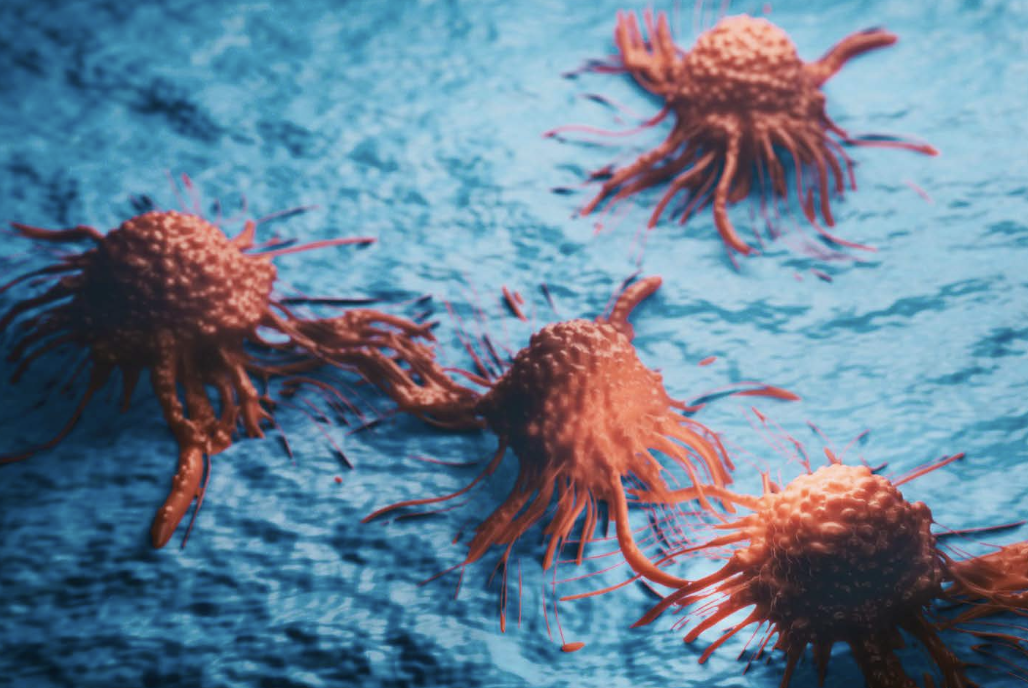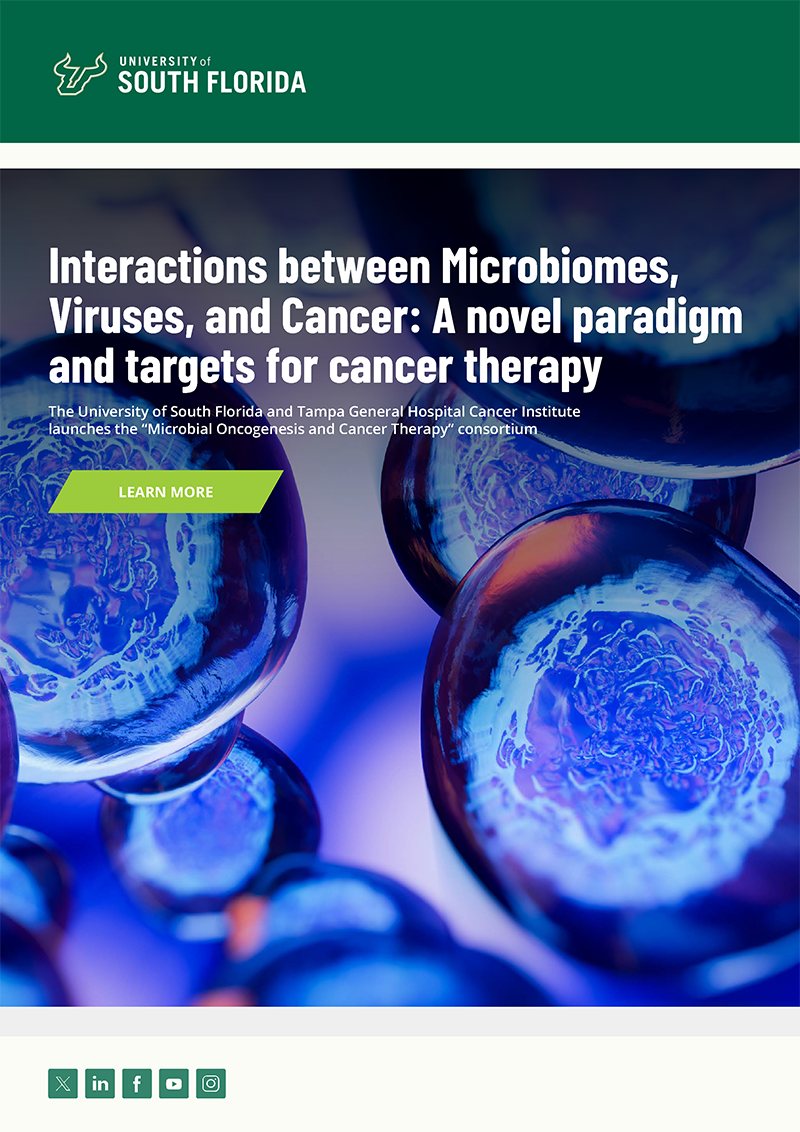The University of South Florida and Tampa General Hospital Cancer Institute launches the “Microbial Oncogenesis and Cancer Therapy” consortium
The University of South Florida (USF) Microbiomes Institute is at the forefront of pioneering research to unlock the mysteries of microbiomes (human, animal, as well as soil and ocean microbiomes) and their profound effects on human health. The potential of microbiome science to revolutionize medical treatment, disease prevention, and aging is unparalleled. The institute aims to develop innovative medical therapies to improve health outcomes, including pre-pro-post-biotics and microbiota transplants.
In this context, the University of South Florida (USF) Microbiomes Institute, the USF Virology Institute, and the Tampa General Hospital (TGH) Cancer Institute are launching a consortium which will merge these three highly renowned research and clinical Institutes, It will investigate how the interactions between some cancer-associated viruses and the huge populations of bacteria (named as “microbiomes”) present in the gut and the cancer tissues can favor persistence of chronic viral infections and growth of cancer and its resistance to treatment. The consortium will lead to merging the efforts of the best experts in these different fields of medicine and should offer a transformational approach to cancer treatment and prevention strategies.
Overview of the “Microbial Oncogenesis and Cancer Therapy” consortium:
Cancer remains a major threat to public health, with 20 million patients with cancer worldwide in 2022, a forecast of 32.6 million in 2045, and, unfortunately, an incredibly significant rise in young people. Despite major progress, we still need to improve early diagnosis and treatments. There is now a better appreciation of the role of microbes in oncogenesis. Indeed, some viruses (such as HTLV1, EBV, HBV, HCV, HPV, and HIV), as well as bacteria (such as Helicobacter pylori, fusobacterium nucleatum, or mycoplasma fermentans), are directly or indirectly driving carcinogenesis by targeting key cellular regulatory molecules and/or stimulating inflammation and impairing the host immune response to the cancer cells.
This has major implications for the prevention and treatment of these cancers. Along those lines, some viral antigens can be used as targets for immunotherapy-based treatment of virus-associated cancers. This has been shown for Human Papilloma Virus antigens and cervical and Head and Neck cancers, as well as for Hepatitis B Virus antigens and liver cancer.
In addition, there is now ample evidence that the gut microbiome shows unique microbial compositions among various cancers; also, it is now clear that each tumor and its metastases exhibit an intrinsic microbiome that significantly impacts the tumor micro-environment and the overall progression of the cancer. Importantly, there is now evidence for the impact of such gut and tumor microbiomes on the response to immunotherapy and chemotherapy; as examples, transplantation of the intestinal microbiota from a patient who has responded to immunotherapy to a previously non responder patient can significantly improve his response to further therapy; this has been in particular shown for melanoma and lung cancer. Treatment with immune checkpoint blockade (ICB) has markedly improved the survival of several cancers. However, a significant proportion of patients show primary or acquired resistance to treatment (up to 50% of patients with melanoma, and 25–44% of patients with non-small-cell lung cancer). In this context, the composition of the gut microbiome appears to be both predictive and prognostic of therapeutic response to ICB. These findings have led to microbiome-based treatment strategies to enhance clinical response to ICB and to mitigate their toxicity. Of note, some Pre-Probiotics- based strategies have been shown to improve the efficacy of some anticancer treatments. Regarding the intra-tumoral microbiome, advances in next- generation sequencing (NGS)techniques are offering a more precise evaluation of the composition and function of the microbiome and its impact on the microenvironment. Yet, it is still unclear why certain intratumor bacteria promote tumorigenesis, while others trigger antitumor immune responses.
Moreover, there is now clear evidence that gut microbiome dysbiosis is an important factor driving the long-term complications of viral infections such as HIV and HPV.
HIV
Many people living with HIV (PWH) are now achieving a life expectancy approaching that of the general population. This is related to the progress of effective antiretroviral therapies (ART).
Yet, unfortunately, such patients frequently show accelerated aging with increased risk of age-related non-communicable diseases (NCD). Inflammation is the main driver of such complications, and is, at least in part, related to gut dysbiosis. Indeed, HIV infection induces both disruption of gut-associated lymphoid tissue, microbial translocation, and an overall shift in gut microbiome composition, resulting in gut dysbiosis. HIV chronic infection is associated with the development of cancer. AIDS-defining cancers (ADCs: Kaposi’s sarcoma, non-Hodgkin’s lymphoma [NHL], invasive cervical cancer) are traditionally distinguished in HIV-infected patients; other cancers are referred to as non-AIDS defining cancers (NADCs). NADCs, in turn, are usually classified into virus-related cancers (HPV-, EBV- and HCV-related cancers) and virus-unrelated cancers.
In fact, 10–20% of all deaths of HIV positive individuals are attributable to cancer and, nowadays people living with HIV still have a 1.6–1.7-fold greater overall risk of cancer development relative to the general population and the risk is rising with age. This can be explained by the association of chronic inflammation, immunosuppression, and the frequent coinfection with other oncogenic viruses (Epstein Barr Virus [EBV], Human Herpesvirus Virus 8 [HHV-8], Human Papilloma Virus [HPV], Hepatitis B and C Viruses [HBV, HCV).
Thus, understanding how gut dysbiosis, inflammation, and cancer development are connected is a most important topic for improving health outcomes of PWH and identifying those at higher risk.

HPV
Nearly 90% of women are exposed to HPV; most infections resolve; however, about 10% persist, and this persistence is associated to increased risk of cervical cancer. Indeed, High-risk types like HPV 16 and 18 are the leading cause of cervical cancer. Importantly, HPV 16 and, to a lesser extent, 18 are associated with other cancers in men and women, such as head and neck (mostly oropharyngeal), anal and penis cancers.
Several studies have now demonstrated that HPV infection is associated with dysbiosis of the vaginal and cervix, characterized by a low proportion of Lactobacillus and increased anaerobic bacteria.
A dysbiotic cervicovaginal microbiome is more permissive to persistent HPV infection; it increases viral oncogene expression and integration of its genome, key steps in cervical carcinogenesis and this eventually leads to cervical dysplasia and cancer. In fact, dysbiosis fosters a pro-inflammatory environment and chronic inflammation further exacerbates epithelial damage, thus favoring oncogenesis. Finally, dysbiosis also impairs mucosal barrier function, stimulating local inflammation, and further promoting viral persistence and genome integration.
Of note, Microbiota of Hispanic women, also frequently exhibit a low lactobacillus distribution, thus resembling that of HPV-infected women and this likely increases their susceptibility to persistent infections. These findings highlight ethnic variability in microbiota composition and its influence on HPV persistence and cancer progression.
Thus, connecting the fields of microbes and cancers (Microbial Oncogenesis) is a major emerging field with enormous potential for innovation and a target for large-scale funding.
The aims and the strategy of the consortium
This consortium will merge the efforts of three major research institutes in Florida, the USF Virology Institute (Headed by Dr. Robert C. Gallo), the USF Microbiomes Institute (Headed by Dr. Christian Brechot and Dr. Hariom Yadav), and the Tampa General Hospital Cancer Institute (Headed by Dr. Eduardo M. Sotomayor). Objectives will be to synergize the efforts of three communities of highly accomplished scientists and physicians into an ambitious initiative aimed to better understand and therapeutically target the interplay between viruses, bacteria/microbiomes, and cancer. The consortium will support major transdisciplinary projects with significant innovative potential as well as interactions between academic and industrial partners. It will develop high-level educational and training opportunities for Florida faculty, graduate, and undergraduate students. Overall, it will offer a bold vision to develop novel therapies and prevention strategies with enormous potential.
These ambitious aims are within the reach of the cadre of expert investigators from the three participating institutes, the stature of the leaders of this application, which includes a member of the National Academy of Sciences and world-renowned investigator (Dr. Robert C. Gallo), a former President of the Pasteur Institute, the French NIH and Vice-President of the holding company Institut Merieux and recently appointed as a fellow of the American Academy of Microbiology (Dr. Christian Brechot), and investigators with a long track record of NIH/NCI funding and expertise in leading and/or participating in Program Project grants or center types of grants (Drs. Eduardo M. Sotomayor, Jack Pledger, Ivan Borello and Hariom Yadav).


